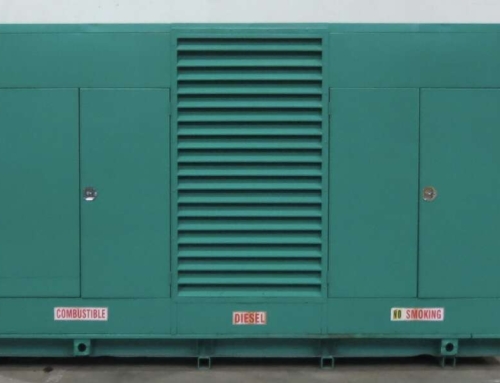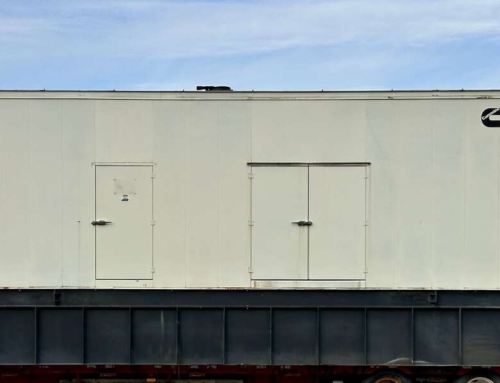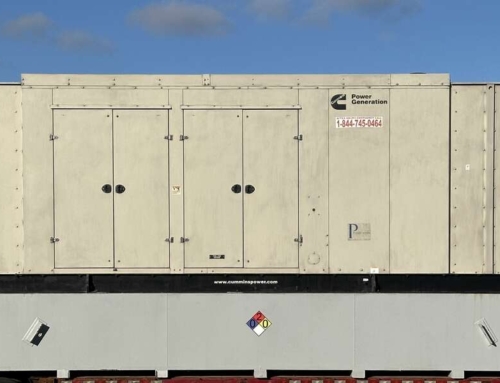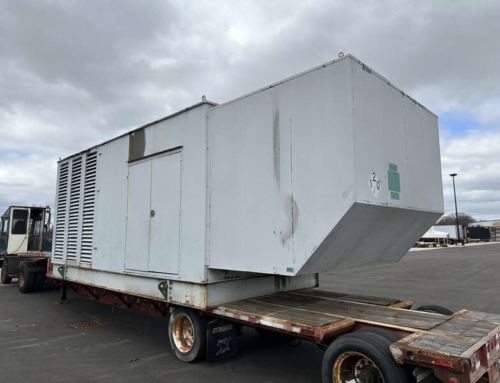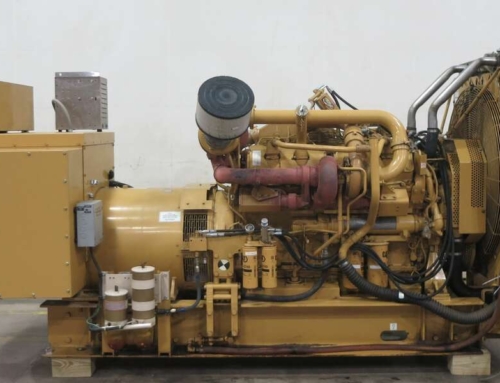When it comes to diesel engines and commercial generators, engine blow by is a very general term. Because of their engineering, all engines experience some degree of blow by, but the issue is magnified in diesel. As general as the term is, it creates a plethora of problems when it happens. You can prevent blow-by by being aware of its indications. To address all those problems, you must know what an engine blow by is, why it happens, and how to diagnose it. And in this definitive guide, we will explore it in detail and depth.
Find related: All About Industrial Diesel Engine Types and Applications
What is Blow By on Diesel Engines?
In a nutshell, blow by in diesel engines is the leakage of combustion gasses and pressure into the engine’s crankcase. It happens when air-fuel mixture or combustion gasses leak into the crankcase from the cylinder wall and pistons of the engine. You have most probably seen or heard it when driving past a car or bus spitting out substantial exhaust clouds.
What Causes Blow By in Diesel Engines?
When an engine blow by occurs, it seriously harms your engine’s fuel economy, performance, and effectiveness. It depletes engine power and increases gas pressure in the crankcase. There are different reasons for it. It can be due to marginal maintenance, bad or broken piston rings, defective or damaged pistons, and gaps between the piston rings. Knowing the causes behind the diesel engine blow by will help you to make the required changes. Let’s explore all the reasons that cause blow by in diesel engines.
01. Damaged, Defective, or Worn Pistons
A damaged piston is considered one of the biggest reasons behind a blow by in diesel engines. They are usually made of aluminum which is a soft metal. It expands quicker than steel when heated. With extensive use, the piston wears out and gets smaller.
As it wears out, the grit gets buildup in the combustion chamber, which carves grooves into the piston. These grooves allow the compressed fuel or air mixture to escape into the crankcase, causing blow by in an engine.
02. Defective, Broken, or incorrectly fitted Piston Rings
Worn or damaged piston rings are another source of blow by in diesel engines. The continual scraping of rings back and forth in the cylinder ultimately wears them down, and their sealing properties fail. The worn piston rings then make it impossible to maintain a close seal.
Incomplete internal combustion deposits soot, sludge, or oil on the piston rings, worsening seal failure. Contaminants from your engine can leave the crankcase and seep into the air if this tight seal is not there or damaged, ultimately leading to the engine blow by.
03. Worn Cylinder Walls
Due to frequent piston and ring scraping, the cylinder walls wear down as the diesel engine ages. This continual scraping expands the cylinder bore over time. As a result, a slop or space forms between the piston and the cylinder. As the distance between the piston and the cylinder wall widens, compressed gasses flow around the piston, causing blow by in engines.
How to Identify and Check for Engine Blow By?
Your generator’s engine gives you numerous indications of it. Carrying out manual checks will reveal whether your diesel engine is experiencing any blow by. If yes, you can then take effective measures to prevent blow by. To check it, you can carry out the following manual checks:
01. Noises
You can usually check the blow by based on the engine’s noise. It can be identified by loud or sputtering engine noises, which released fumes or exhaust clouds may follow.
02. White Smoke
One of the most evident signs of an engine blow by is White smoke billowing from the oil-fill tube or aperture on a valve cover. It also indicates that blow by is severe and needs immediate attention. Test this by placing the oil filler cap on the tube or aperture upside down. There is too much crankcase pressure if it blows off right away.
03. Oil film
A coating of oil film surrounding the tube is another clear indicator. Engine blow by usually causes unburned gasoline to contaminate the oil and flow into the crankcase. If there is too much blow by, the mixture may cause diesel to escape if it reaches the combustion chamber.
04. Increased Oil and Fuel Consumption
If your engine consumes more oil or fuel than usual, it might indicate that some of it leaks into the crankcase and creates blow by.
05. Soot Buildup
Blow by adds to increased incomplete combustion, which results in soot retention inside the cylinder walls. Excessive soot suggests the need for an oil change or may indicate more serious underlying issues.
06. Rough Idling or Misfiring
Blow by get in the way of critical engine functions. It makes it difficult for the generator to start. In some cases, it also makes it challenging to keep it running.
What Is the Effect of Blow-By on Diesel Engines?
Engine blow by causes numerous problems that are difficult to overcome if neglected. To start with, it reduces the engine performance because of the lack of compression. Diesel engines utilize compression ignition that converts fuel to energy by pressuring the cylinder, generating heat, and igniting diesel fuel. When a cylinder leaks, it cannot hold as much pressure, resulting in misfiring and poor engine performance.
As gasses expand and slide past the piston rings, they cannot efficiently force the piston down. It causes the engine to produce insufficient output during the power stroke, resulting in decreased horsepower. Blow by also covers sections of the intake with oil and gasoline.
As piston rings and cylinder walls wear and degrade, more fuel, air, and moisture enter the crankcase and harm the components. It makes the engine produce significantly louder noise, pushing toxic exhaust gases out of the engine vents.
The blow by causes the engine to consume more fuel. If air, gasoline, or moisture enters the crankcase, it contaminates and dilutes the oil. Contaminants may enter the crankcase if any leftovers of gasses, unburned gasoline, moisture, sulfur dioxide, or soot particles are left in the compression chamber of your engine. They will then leak into the engine and cause severe damage.
What is the Normal Amount of Engine Blow By?
A leak-down test on a diesel engine is a more exact way of determining the quantity of blow by. Because piston rings are not entirely impervious, all engines have some degree of blow by. A 12-liter engine in excellent condition may experience 1.5 cubic feet per minute (cfm) of blow-by under normal running circumstances. This number climbs to 3.5 cfm in colder conditions. Excessive blow-by indicates more significant problems that must be resolved before operations may restart.
How Can You Prevent Engine Blow By?
When it comes to blow by, an ounce of prevention is worth a pound of cure. As serious as the problem is, it can be easily prevented from occurring. Three of the best ways to prevent engine blow by are:
- Regular Maintenance: Lack of maintenance is one of the top reasons behind engine blow up. To prevent it from happening in the first place, you need to carry out regular engine maintenance. It is the key to reducing the chances of engine blow-by.
- Check for Solid Carbon Buildup: Carry out frequent checks for solid carbon buildup. Once formed, it will erode metal and damage the engine over time. You can use certain treatments to break down these dangerous solids, which will then be easier to remove.
- Use of Premium Fluids: Although little expensive, top-tier oil will help you prevent solid carbon buildup and help keep the engine in great shape for longer. Frequently changing the engine’s oil will keep the engine running longer and ensure combustion occurs correctly. You should routinely collect oil samples and have them inspected for any foreign particles and residue.
Final Takeaways,
Regular maintenance and monitoring are the best ways to prevent engine blow-by. And we at Central State Diesel Generators assist you with just that. Our staff of skilled technicians is always available and prepared to assist you, regardless of which generator you use and when you purchased it. If your generator is experiencing engine blow by, we will guide you at every step and address every problem.
Mostly Asked Questions About Diesel Engine Blow By
01. How normal is engine blow by?
Engine blow-by is, unfortunately, a common occurrence in diesel engines. In some cases, it is inevitable. It severely affects the engine’s performance and functionality. That is why addressing it as soon as you notice it is essential. And you must resolve it right away.
02. Is engine blow by bad for your engine?
Yes, engine blow by is extremely bad for your engine. It affects the performance and makes the car consume more fuel. Besides more oil consumption, it also significantly reduces your engine’s torque and horsepower.
03. How can you prevent engine blow by?
The easiest way to prevent engine blow-by is to do regular maintenance and monitor things. Also, replace piston rings and pistons.
04. What are the top 3 signs of blow by engine?
The top 3 signs of blow-by are:
- Excessive Smoke: Blue or white smoke from the exhaust indicates oil burning.
- Oil Leaks: Oil collecting around the engine breather or other areas.
- Loss of Power: Reduced performance or difficulty in maintaining load.




